Instructions on how to eat vegetarian properly
Interested in experiencing vegetarianism? So read this article to pick up some useful tips to help you follow a balanced vegetarian diet, learn more about how to eat a vegetarian diet properly, and how to eat a vegetarian diet with all the important nutrients you need to stay healthy. stay strong and stay healthy.
Many people choose to be vegetarian for a variety of reasons, from religious to ethical and social. There is no single form of vegetarianism because many people practice vegetarianism in different ways.
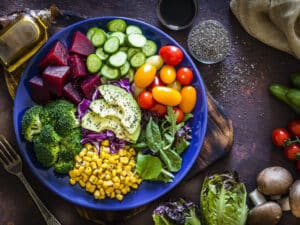
Illustrative image source: Internet
- Lacto-ovo vegetarian diet : Eliminates meat, fish, and poultry but allows eggs and dairy products.
- Lacto-vegetarian diet : Eliminates meat, fish, poultry and eggs but allows dairy products.
- Ovo vegetarian diet : Eliminates meat, fish, poultry, and dairy products but allows eggs.
- Pescetarian diet : Eliminates meat and poultry but allows fish and sometimes eggs and dairy products in the diet.
- Vegan diet : Eliminates meat, fish, poultry, eggs, and dairy products, as well as other animal-based products, such as honey.
Interestingly, some people fast on certain days of the week, while others fast periodically and become almost completely vegetarian. Differences in habits and needs lead to a variety of vegetarian options. With all the different styles of vegetarianism, the nutritional challenges are also different.
The good news is that there is ample evidence that a healthy, balanced vegetarian diet is associated with a lower Body Mass Index (BMI), lower blood cholesterol levels and a reduced risk of death from heart disease .
One study in 76 people linked a vegetarian diet to reduced levels of triglycerides, total cholesterol and “bad” LDL cholesterol – all of which are risk factors for heart disease when present at high levels.
Similarly, other research indicates that a vegetarian diet can reduce blood pressure , another major risk factor for heart disease.
If you are a vegetarian or want to become one, here are some practical tips for eating towards a better nutritional balance.

Illustrative image source: Internet
Consume enough plant protein
A common temptation in modern vegetarianism is to prepare meals that consist only of rice or noodles with vegetables. While you abstain from foods of animal origin, remember to replace them with plant proteins .
The right plant-based foods are an excellent source of protein and other nutrients and often contain fewer calories than animal products.
If you are new to vegetarian ways, you can try following traditional vegetarian ways.
- Chinese vegetarian dishes contain soy-based products such as tofu and taukwa or seitan as part of main meals. Delicious desserts made with dried beans, nuts and seeds also provide protein to round out the meal.
- Indian vegetarian meals serve savory lentils and whole dried beans to complement main meals. Combining with yogurt also increases the protein content in the diet.
Examples of servings of plant protein are half a packet of tofu (150g) or one cup (120g) of cooked beans (peas, beans, lentils). You need to aim for 2 to 3 servings per day. So get enough through meals and snacks to reach your daily protein goal.
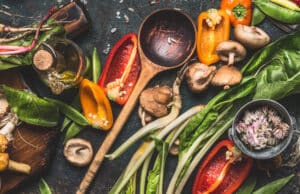
Illustrative image source: Internet
Some plant products, such as soybeans and quinoa, are complete proteins, meaning they contain all nine essential amino acids that humans need. While the rest often lack an essential amino acid needed to create protein for the body. So eating a varied diet is very important .
In the past, you may have heard about adding plant-based protein to every meal with grains, nuts, or seeds.
But now, we know that as long as you eat a balanced diet, including grains, nuts, and seed foods that contain the missing amino acids, your diet will provide all the amino acids needed to effectively build and repair proteins in the body.
Find a great balance
Vegetarians must also eat a balanced diet. My Healthy Plate provides the best guide to choosing a variety of foods from each of the 4 food groups in the correct proportions.
One-quarter whole grains
Whole grains are rich in nutrients because they are not processed and retain their original state. Eating whole grains can help with weight control, as well as may help reduce the long-term risk of developing chronic diseases such as heart disease, diabetes and some cancers .
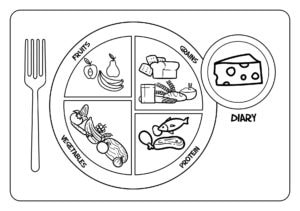
Illustrative image source: Internet
One-quarter protein
Plant-based proteins such as soy milk, tofu, tempeh, nuts and beans are good sources of protein for the body. Protein is the building block of almost everything in the body. Adding protein to your diet helps keep your muscles, bones, organs, skin and nails healthy .
Half fruit and vegetables
Fruits and vegetables not only add beautiful color and delicious flavor to meals, but also provide healthful nutrients. A diet rich in fruits and vegetables helps prevent many diseases .
Pay attention to nutritional deficiencies
Vegetarian diets tend to be deficient in iron, calcium and vitamin B12. So here's a ready-made reference to plant sources of these important nutrients:
| Nutrients | The main source of supply is from plants |
| Iron | Green leafy vegetables, lentils, beans, iron-fortified foods and dried fruit |
| Vitamin B12 | Tempeh, dairy products, eggs, fortified products (e.g. cereals) |
| Calcium | Dairy products, green leafy vegetables, calcium-fortified products such as soy milk, water, juice, cereal, bread, cookies; Tofu is made with calcium salt |
| Zinc | Whole grains, nuts and legumes |

Illustrative image source: Internet
Some nutrients are more difficult to get from a vegan diet, but with a careful plan, there's no reason you can't get all the nutrients you need. Food is always the preferred choice, but in some cases, adding essential vitamins, minerals and nutrients to the diet will be the appropriate choice.
Vegans can take daily supplements to meet their target needs for vitamin B12. Depending on the type of vegetarian diet you choose, other vitamin and mineral supplements may also be needed, especially iron and calcium. Consult a healthcare professional to personalize your supplement needs.
Keep your choices low in fat
Plant proteins are naturally cholesterol-free and low in fat, especially saturated fat . However, many vegetarian cuisines tend to add a lot of fat and deep-fried items to serve popular delicacies.
So keep your vegetarian diet healthier by using less oil and using healthy oils with less saturated fat when cooking . Some healthy vegetable oils you can consider using in cooking include coconut oil, avocado oil, rice bran oil, canola oil, olive oil...
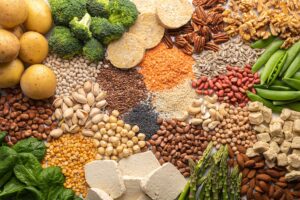
Illustrative image source: Internet
Add moderate amount of salt
Many chefs use sodium-containing salts and spices and flavor enhancers to add flavor to vegetarian dishes. Excess sodium increases blood pressure because it retains excess fluid in the body and puts an additional burden on the heart. Too much sodium increases the risk of stroke, heart failure, osteoporosis, stomach cancer and kidney disease.
While many plant foods are healthy on their own, you need to preserve those health benefits by cooking them properly.
If you want to add more flavor, choose fresh ingredients, increasing the amount of herbs like basil, oregano, coriander, garlic and spices you add to your food. Soybeans, mushrooms and tomatoes are great sources of naturally delicious flavors. So, prepare delicious provisions and always be ready to add them to dishes.

Illustrative image source: Internet
Choose whole grains more often
To improve your vegetarian diet by just one small aspect, consume whole grains.
Whole grains provide all the health benefits of grains, unlike refined grains, which are stripped of valuable nutrients during the refining process. All whole grains contain three parts: the bran, germ, and endosperm. Each serving contains health-promoting nutrients.
Change your usual choices from white rice to whole grain, white bread to whole wheat bread, rice noodles to brown rice noodles, and pasta to whole wheat pasta. These foods are a valuable source of many nutrients such as fiber, B vitamins and vitamin E.
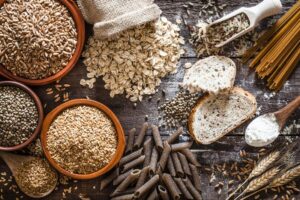
Illustrative image source: Internet
Regularly eating whole grains may reduce your risk of heart disease, type 2 diabetes, and obesity. Fiber-rich foods like whole grains also significantly improve digestive health.
A wiser way to increase your consumption of nutritious whole grains is to incorporate small amounts into your regular refined options or make whole grains one of your main meals.
Article combined with ACVN & Healthhub.sg
Translator Trinh Le